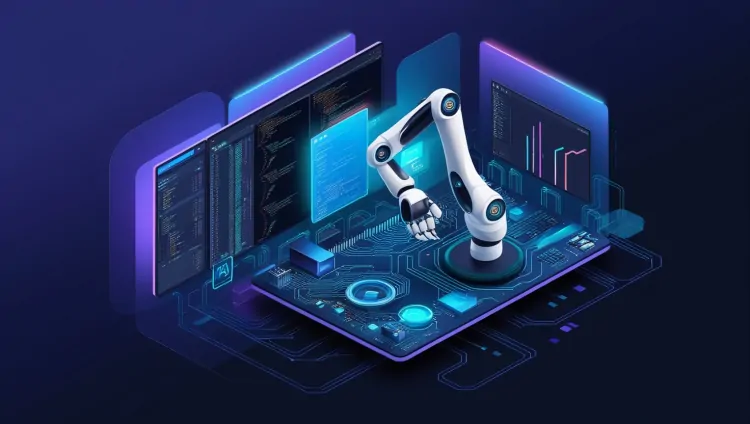AI in Software Development in 2025: Key Opportunities + Challenges
AI is reshaping the software development landscape, offering unparalleled opportunities to enhance productivity, quality, and user experience.

Artificial Intelligence (AI) is revolutionizing the way software is designed, developed, and maintained. In the simplest terms, AI leverages algorithms and machine learning models to enable systems to mimic human intelligence. Within the software industry, AI empowers developers by automating mundane tasks, detecting anomalies, and even predicting outcomes.
Why is AI such a game-changer? Because it amplifies productivity, fosters innovation, and reduces human error. Companies are now able to build smarter applications, tailor user experiences, and significantly cut development time. For instance, AI-powered platforms like GitHub Copilot are providing coding suggestions in real time, making the development process more efficient.
Historical Context
AI's integration into software development for MVP development services didn’t happen overnight. From early automation tools to today’s advanced AI models like GPT and deep learning, the journey has been remarkable.
Evolution of AI in Software Development
In the 1980s and 1990s, automation tools and integrated development environments (IDEs) began transforming coding practices. Fast forward to the 2000s, and AI algorithms found their way into debugging tools, optimizing code quality. In recent years, advances in natural language processing (NLP) have allowed AI to understand, write, and even debug code like a skilled programmer.
Key Milestones Leading to Today’s AI-Driven Development
Some major milestones include:
-
Development of neural networks in the 1990s.
-
Introduction of machine learning frameworks like TensorFlow.
-
Emergence of AI-driven tools like Copilot and TabNine.
Key Opportunities of AI in Software Development
Automation of Repetitive Tasks
AI excels in automating tedious, time-consuming tasks, freeing developers to focus on more creative and strategic aspects of software building.
By automating tasks such as code generation, testing, and deployment, AI dramatically reduces the workload on developers. This boosts productivity, minimizes human error, and saves both time and resources.
Examples of Tools Leveraging Automation
Tools like Jenkins (for continuous integration) and AI-powered platforms like Katalon are changing the game. These platforms perform routine checks, flagging potential issues before they escalate into full-blown bugs.
Enhanced Code Quality
AI helps elevate the standard of code produced by detecting and correcting issues early in the development process.
AI-Driven Debugging Tools
AI-powered debugging tools like DeepCode and SonarQube analyze vast amounts of code in seconds. They identify vulnerabilities, recommend optimizations, and even predict the likelihood of bugs, ensuring more stable applications.
Impact on Reducing Errors and Improving Reliability
By automating code reviews and enhancing static code analysis, AI contributes to robust, error-free software, saving businesses costly fixes down the line.
Faster Software Development Cycles
Accelerating development timelines is one of the most exciting benefits of AI in software development.
How AI Accelerates Timelines
AI reduces the time spent on repetitive tasks like testing, mobile app development, and deployment, streamlining workflows. Teams can now achieve months’ worth of development in a matter of weeks.
Agile Development with AI Integration
AI aligns seamlessly with agile methodologies, enabling rapid iteration cycles and continuous delivery. Tools like Jira, now with AI integrations, are supporting teams in planning and tracking efficiently.
Improved User Experience
AI is a cornerstone of enhanced user experiences, providing insights and recommendations based on real-time data.
Role of AI in Predictive Analytics
AI analyzes user behavior patterns to predict future needs. This data-driven approach enables companies to anticipate problems and provide preemptive solutions.
Personalization Through Machine Learning Algorithms
AI-powered personalization engines customize experiences for individual users. Netflix’s recommendation system and Spotify’s Discover Weekly are prime examples of how AI transforms user interaction.
Better Decision-Making
With AI’s ability to process large datasets, developers and managers can make well-informed decisions.
AI in Analyzing Large Datasets
AI tools like Tableau and BigML offer actionable insights by analyzing trends and identifying risks.
Real-World Applications in Software Project Management

AI predicts project outcomes, manages resources efficiently, and minimizes risks, making it an invaluable asset for project managers.
Challenges of AI in Software Development
High Implementation Costs
Despite its potential, integrating AI into software development can be prohibitively expensive, especially for smaller organizations.
AI tools often require significant upfront investment in infrastructure, software, and expertise. For startups or businesses with limited budgets, these costs can become a roadblock to adopting AI-driven technologies.
Strategies to Minimize Costs
To address this, organizations can explore cloud-based AI services, which eliminate the need for costly infrastructure. Open-source AI tools like TensorFlow and PyTorch also provide powerful capabilities at a lower cost. Additionally, strategic partnerships with AI vendors can reduce the financial burden.
Ethical Concerns
The rapid adoption of AI in software development raises critical ethical questions, especially concerning data privacy and fairness.
Data Privacy Challenges in AI Development
AI systems often require vast amounts of data to function effectively. This dependency can lead to privacy concerns, particularly when handling sensitive user information. Developers must adhere to regulations like GDPR and CCPA to ensure data security and compliance.
Bias and Fairness in AI-Driven Tools
AI algorithms are only as good as the data they are trained on. If this data contains biases, the resulting software may perpetuate those biases. For example, recruitment software using biased datasets may favor one demographic over others. Ensuring diverse and representative datasets is critical to building fair AI systems.
Skills Gap
The growing demand for AI expertise highlights a significant skills gap in the workforce.
Need for Specialized AI Expertise
AI implementation requires knowledge of machine learning, data science, and advanced programming. However, these skills are not yet widespread, creating a bottleneck for organizations looking to adopt AI technologies.
Upskilling the Workforce in AI Technologies
To overcome this, companies can invest in training programs, workshops, and certifications. Encouraging employees to pursue courses in AI and related fields can help bridge this gap. Collaborative platforms like Coursera and Udemy offer accessible training modules to enhance technical expertise.
Integration Complexity
Seamlessly integrating AI into existing systems is another hurdle that developers and organizations face.
Compatibility Issues with Existing Systems
Legacy systems are often not designed to accommodate AI technologies. Integrating AI may require reconfiguring these systems or replacing them entirely, which can be both costly and time-consuming.
Solutions for Seamless AI Integration
Adopting modular and API-driven AI systems can simplify integration. These solutions enable interoperability without extensive modifications to existing infrastructures. For instance, platforms like AWS AI services offer prebuilt integrations for smoother adoption.
Over-Reliance on AI
Relying too heavily on AI can lead to unintended consequences, especially in critical areas like security and decision-making.
Risks of Dependency in Critical Applications
AI is not infallible. Errors or failures in AI systems can have far-reaching consequences. For example, an over-reliance on AI in cybersecurity can leave networks vulnerable if the system misclassifies threats.
Balancing AI with Human Oversight
Maintaining a balance between AI and human judgment is essential. Humans must remain involved in critical decisions, acting as a safety net to counteract potential AI errors or biases.
Future Trends in AI and Software Development
The Rise of AI-Augmented Development Tools
As AI continues to evolve, development tools will become increasingly sophisticated. Tools like GitHub Copilot are just the beginning. The future will likely see AI systems that can build entire software applications with minimal human input.
Increased Collaboration Between AI and Developers
Rather than replacing developers, AI will act as a collaborator. Developers will use AI to handle routine tasks, while focusing on creative and strategic elements. This partnership will redefine how software is built.
Democratization of AI in Software Development
The accessibility of AI tools will continue to grow, enabling more developers and smaller companies to leverage AI. Open-source platforms and community-driven projects will play a vital role in democratizing AI.
Conclusion
AI is reshaping the software development landscape, offering unparalleled opportunities to enhance productivity, quality, and user experience.
However, the challenges of high costs, ethical concerns, and integration complexity cannot be overlooked. Organizations must adopt a balanced approach, leveraging AI’s strengths while addressing its limitations.
As the technology matures, AI will not only accelerate software development but also empower developers to create more innovative and impactful applications. By preparing for the challenges today, businesses can fully unlock AI’s potential in the future.
Frequently Asked Questions
What is AI’s role in software development?
AI automates repetitive tasks, improves code quality, accelerates development timelines, and enhances user experiences, making software development more efficient and innovative.
How does AI improve software development efficiency?
AI tools streamline workflows by automating testing, debugging, and deployment processes. They also provide real-time coding suggestions and analyze data for better decision-making.
What tools are available for AI-driven software development?
Popular tools include GitHub Copilot for coding assistance, TensorFlow for machine learning, and Jenkins for automation. Many cloud-based platforms also offer AI capabilities.
What's Your Reaction?















